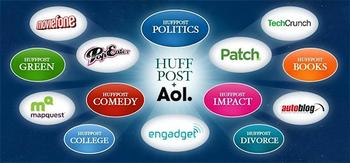Buying traffic
Here's a not very well guarded secret of journalism: if in doubt, keep it vague. With that in mind we have generally referred to AOL as an ‘Internet giant', because we've never been too sure what its core area of business actually is.
But the news that AOL has acquired politics and entertainment news and opinion blog The Huffington Post for $315 million means that we can probably start calling it ‘online media giant' now, without fear of getting on the wrong side of the pedants.
While we seldom have occasion to read HuffPo here at HEXUS, we are regular readers of two of its now sister blogs: Engadget and TechCrunch, which were also AOL acquisitions, albeit for much less. So we had already regarded AOL as a major force in tech news, but this latest acquisition cements it as a huge player in blogging across the board.
The eponymous editor of HuffPo - Arianna Huffington - will be editor-in-chief of all AOL content, including the above, and will be president of a new division within AOL that covers journalism called The Huffington Post Media Group.
"The acquisition of The Huffington Post will create a next-generation American media company with global reach that combines content, community, and social experiences for consumers," said Tim Armstrong, chairman and CEO of AOL. "Together, our companies will embrace the digital future and become a digital destination that delivers unmatched experiences for both consumers and advertisers."
"By uniting AOL and The Huffington Post, we are creating one of the largest destinations for smart content and community on the Internet," said Huffington.
The thinking behind creating any media giant, or any conglomerate at all for that matter, is efficiencies and economies of scale. Advertisers can engage with many titles in one go and resources such as development, hosting, and back-office stuff can be pooled. But buying any company, let alone an outspoken blog, can come with integration issues.
It will be especially interesting to see what the founder of TechCrunch - Michael Arrington - has to say about the acquisition. He had yet to blog on the matter at time of writing, but has wasted little time since being acquired late last year in getting into a domestic with Engadget. Apparently TechCrunch didn't even get sent the press release which, while funny, will surely have got Arrington's back up.
The other challenge AOL has is combining quality, distinctive journalism with an efficient business model. Business Insider got hold of an internal AOL document last week, which it is using to train its editors. The document puts an overriding emphasis on volume of stories and traffic. Pretty logical and self-explanatory stuff, given that traffic - or eyeballs - is effectively what online media sell to advertisers.
But while good stories should yield good traffic, there are some pitfalls with asking journalists to be traffic-generation machines first, and writers second. It's not too hard to write stories that generate traffic; it's all in the headline. So conflict, sex, wild speculation, etc in the headline will all improve your reads, then all you need to do is justify the headline in your body copy.
The problem comes when that doesn't happen, when a reader clicks on a hyperlink and finds it made a false promise, which the body copy doesn't deliver on. Surely, no matter how much passing search engine traffic you get from such activity, the bad faith you show to regular readers by doing this will surely be self-defeating as people stop clicking on your links for fear of being conned once more.
Aside from the potentially detrimental effect on the morale of passionate writers of asking them to operate like factory production-line workers, another problem with a focus on SEO (search engine optimisation) is social networking. People are increasingly clicking on stories not through a Google search, but via links on Facebook and Twitter. We assume most people bother to read the body copy of a story before recommending it to their friends.
We'll leave you with this diagram showing the new AOL media empire. Apparently HuffPo is read predominantly by women, so does that explain why it has an entire sub-site devoted entirely to divorce?







